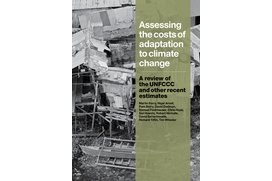IPS - TerraViva reports on Beijing+15 Conference with articles on the situation of women and women’s rights worldwide as well as reports on women’s issues progress in international institutions. Read more
IPS - TerraViva reports on Beijing+15 Conference with articles on the situation of women and women’s rights worldwide as well as reports on women’s issues progress in international institutions. Read more
Jason Hickel asks whether ‘environmental determinism’ – the theory that Africa’s development has been hindered as a result of ‘the environmental conditions that Africans inhabit’ – accurately explains Africa’s poverty. While he commends its attempt to stop blaming underdevelopment ’on the (…)
The birthplace of the World Social Forum (WSF), conceived as an alternative to international meetings pursuing free-market economics, Brazil is on its way to becoming a major economic power, analysts say. The question is, what kind of model will it adopt to avoid the behaviour it has previously (…)
On Democracy Now!, a tribute to the late historian, writer and activist Howard Zinn, who died suddenly on Wednesday of a heart attack at the age of eighty-seven. Howard Zinn’s classic work A People’s History of the United States changed the way we look at history in America. It has sold over a (…)
Under the title “Haiti: Microcosm of the crisis of development”, issue 467 of Pambazuka News, "the authoritative electronic weekly newsletter and platform for social justice in Africa", features several articles on the Haiti quake, its causes and the political lessons to be drawn from this (…)
In the last three decades, changes in the global economy have led to debt and balance of payments crises in many African countries. They desperately needed foreign exchange which they could only get from the World Bank and the IMF. These institutions used this opportunity to expand their (…)
Millions of people around the world who belong to indigenous communities continue to face discrimination and abuse at the hands of authorities and private business concerns, says a new U.N. report.
It is happening not only in the developing parts of the world but also in countries such as the (…)
Ten years after the publication of "No Logo", Klein looks at how Obama created a brand that won him the Presidency. Will his failure to live up to his lofty brand cost him?
Text extracted from a 10th anniversary edition of No Logo to be published by Fourth Estate on 21 January. Read more
The blame game Martin Khor, Blame Denmark, not China, for Copenhagen failure, The Guardian: The decision to override the multilateral process and hold a secret meeting of select nations ruined any chance of success Mark Lynas (British, adviser to the Maldives delegation), How do I know China (…)
An American World of War: What to Watch for in 2010
According to the Chinese calendar, 2010 is the Year of the Tiger. We don’t name our years, but if we did, this one might prospectively be called the Year of the Assassin.
We, of course, think of ourselves as something like the peaceable kingdom. After all, the shock of September 11, 2001 was (…)
The road to stability runs through Kashmir. With its latest surge, America has taken a terrible diversion.
Meeting George Bush at the White House to discuss Afghanistan, the Pakistani journalist Ahmed Rashid once marvelled at how a "US president could live in such an unreal world, where the (…)
Immanuel Wallerstein comments on the global financial crisis from a long-term historical perspective, and on the opportunities it offers for global justice movements (Harold Wolpe Lecture, University of KwaZulu-Natal, 5 November 2009). Read more
Next month, at the climate change summit in Copenhagen, the wealthy nations that produce most of the excess carbon in our atmosphere will almost certainly fail to embrace measures adequate to ward off the devastation of our planet by heat and chaotic weather. Their leaders will probably promise (…)
Migrants’ rights have to be addressed on two fronts: end the neoliberal policies that are responsible for creating poverty in their home countries, thus forcing them to emigrate, and demand that they are given full rights in their host countries. Read more

IIED, 111 p.
This book takes another look at the costs of adapting to climate change. The estimates for 2030 used by the UN Framework Convention on Climate Change are likely to be substantial under-estimates. Professor Martin Parry and his co-authors look at the estimates from a range of perspectives, and (…)
Global initiatives have in recent years stressed the contribution that arts and culture can make to development. This has led African and European artists, bureaucrats and policy makers to increasingly confront the unequal relations in North-South cultural and artistic exchanges. Read more
Immigrant high school and university students in the United States have used the internet effectively in building activist networks to support the passing of a law called the DREAM act.
«I have been living in the U.S. for most of my life and now that i have graduated high school i can’t (…)
Despite the often benign intent behind collaborative European ‘research’ into integrated land, air, maritime, space and cyber-surveillance systems, the EU’s security and R&D policy is coalescing around a high-tech blueprint for a new kind of security. It envisages a future world of red zones (…)
Despite changes in rhetoric, IMF policy advice and conditions are still having the same detrimental effects on social protection, decent work and poverty in countries forced to take out loans due to the financial crisis, a new report released today shows.
Published on the eve of the (…)
Focus on the Global South
As the self appointed economic guardians of the world and thousands of protesters converge on Pittsburgh for the third summit of the Group of 20, expectations are low that a breakthrough in the form of some coordinated action to come to grips with the global economic crisis will issue from the (…)